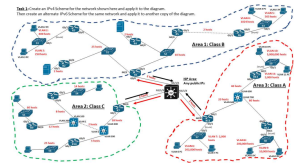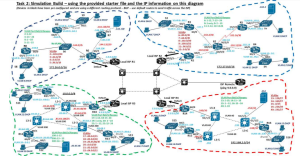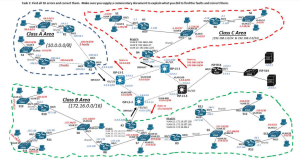The Full Process: From IP Schemes, To Simulations and to Troubleshooting
This assessment will allow you to show your mastery of your learning in the networks part of this module.
There are three tasks to complete:
Task 1: The IP schemes
For this task, take the network diagram shown below and create two IP schemes – one for IPv4 and another for IPv6. You should choose suitable IP address ranges as appropriate. You should supply a scheme table for each version, and a reworked diagram showing your IP scheme applied to the diagram. There is a link to a Powerpoint version of this network for ease of applying the scheme. Available here
Task 1: Create an IPv4 Scheme for the network shown here and apply it to the diagram. Then create an alternate IPv6 Scheme for the same network and apply it to another copy of the diagram.

Do You Need Assignment of This Question
Task 2 Simulation
For this part of the assessment, you are to build a simulation in Packet Tracer to match the IP scheme diagram below. This is also available in PDF form so you can have a paper version if you wish when working with the simulator. This is available here black devices have already been configured for you and are available as a starter network This network will use IPv4 and OSPFv2. The here. This part of your assessment is worth 50 marks out of a possible 100.
Task 2: Simulation Build – using the provided starter file and the IP information on this diagram (Devices in black have been pre-configured and are using a different routing protocol-BGP-use default routes to send traffic across the ISP)

Task 3 The Troubleshooting Task
In this part you need to examine the network below very closely. You will also need to download the network simulation as it stands This network is suffering from 10 faults which is stopping the simulation working. Your task is to track down each fault and rectify it whilst writing up how you found and fixed the fault. The Packet Tracer file we are using is a self-marking simulation – as you find and rectify the faults, the completion percentage will rise. Make sure you save the file regularly as you locate and fix faults in case of system crashes.
Please do understand though that a complete reconfiguration of a device is not acceptable as a fix for any fault! Include your repaired simulation with your commentary (max 1000 words) on how you found and fixed those faults. A PDF version of this diagram This task is worth 20 out of a possible 100 marks. is also available for your convenience here.

Buy Answer of This Assessment & Raise Your Grades
Guidelines
This assignment should be submitted no later than Monday of next week (week 8) 23:59 UK time. You should submit your work as a single .ZIP archive – here is a check-list of all the diagrams to include:
- An IPv4 scheme table and annotated network diagram.
- An IPv6 scheme table and annotated network diagram.
- A completed Packet Tracer simulation for Task 2 – created in version 7.3.1 or higher.
- A completely fault-free Packet Tracer simulation for Task 3.
- A commentary document (max 1000 words) explaining how you found the faults from the Task 3 network and how you repaired them,.
This work must be your own individual work. Grading This activity will be graded and you will receive feedback on it. The following rubric is provided below to help you understand how you will be graded.
Are You Looking for Answer of This Assignment or Essay
The post IP schemes, Network Simulation and Troubleshooting In Packet Tracer appeared first on Students Assignment Help UK.